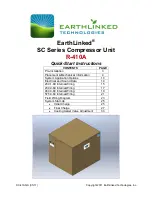
MU-LPNITROX-0919
LP-250-300-600 NITROX
13
- 80
ENGLISH
DANGER:
- Before carrying out any work on the compressor each
operator must have a perfect understanding of how the
compressor works, know how to use the controls and have
read the technical information contained in this manual.
- It is forbidden to use the compressor under conditions /
for purposes other than those indicated in this manual
and AEROTECNICA COLTRI cannot be held liable for
breakdowns, problems or accidents caused by failure to
observe this rule.
- Check that the fittings provide a proper seal by wetting
them with soapy water: eliminate any leaks.
- Do not attempt to repair high pressure hoses by welding
them.
- Do not empty the bottles completely, not even during
winter storage, so as to prevent damp air getting in.
- It is forbidden to tamper with, alter or modify, even
partially, the systems and equipment described in this
instruction manual, especially as safety guards and safety
symbols are concerned.
- It is also forbidden to carry out work in any way other than
that described or to neglect the illustrated safety tasks.
- The safety information and the general information given
in this manual are highly important.
- Do not use flammable solvents for cleaning the compressor
and other parts.
The compressor must only be used in environments having the
characteristics described in the following table.
AREA OF MACHINE USE: ESSENTIAL DATA TABLE
Temperature ambient
°C - (°F)
Min.-5°C (+23°F)
Max.+40°C (+104°F)
Air humidity
%
max.80%
Tolerated weather conditions
rain
hail
snow
None
Max tilt angle (bank)
%
6%
Check that the area in which the compressor is to be positioned is
adequately ventilated: good air exchange with no dust and no risk of
explosion, corrosion or fire.
If ambient temperatures exceed 40°C air conditioning will be required.
Make sure that lighting in the area is sufficient to identify every detail
(such as the writing on the info plates/stickers); use artificial lighting where
daylight on its own is insufficient.
Each compressor is carefully run and tested prior to delivery.
A new compressor must nevertheless be used with caution during the first
5 working hours so as to complete proper running in of its components.
If the compressor is subject to an excessive workload during initial use, its
potential efficiency will be prematurely compromised and functionality
soon reduced. During the running in period proceed as follows:
After the first 50 hours carry out-in addition to the scheduled maintenance
the following tasks:
- change the compressor oil;
- check and adjust nuts and bolts.
1.10
RUNNING IN AND TESTING THE COMPRESSOR
1.9
WHERE THE MACHINE MAY BE USED
ITALIANO
ATTENZIONE:
- Prima di iniziare qualsiasi lavoro sul compressore ogni
operatore deve conoscere perfettamente il funzionamento
del compressore e dei suoi comandi ed aver letto e capito
tutte le informazioni tecniche contenute nel presente
manuale.
- Si fa divieto di impiegare il compressore in condizioni
o per uso diverso da quanto indicato nel presente
manuale e AEROTECNICA COLTRI non può essere ritenuta
responsabile per guasti, inconvenienti o infortuni dovuti
alla non ottemperanza a questo divieto.
- Controllare la tenuta dei raccordi bagnandoli con
dell’acqua e sapone ed eliminare le eventuali perdite.
- Non riparare le tubazioni ad alta pressione con delle
saldature.
- Non svuotare le bombole completamente, anche durante
lo stoccaggio invernale, onde evitare l’ingresso di aria
umida.
- Si fa divieto di manomettere, alterare o modificare, anche
parzialmente, gli impianti o le apparecchiature oggetto del
manuale di istruzione, ed in particolare i ripari previsti e i
simboli per la sicurezza delle persone.
- Si fa altresì divieto di operare in modo diverso da quanto
indicato o di trascurare operazioni necessarie alla sicurezza.
- Particolarmente importanti sono le indicazioni per la
sicurezza, oltre a informazioni di carattere generale
riportate su questo manuale.
- Non utilizzare solventi infiammabili per la pulizia del
compressore o parti di esso.
L’utilizzo del compressore deve avvenire in ambienti con le caratteristiche
descritte nella tabella seguente.
TABELLA DATI SULL’AMBIENTE D’UTILIZZO PREVISTO
Temperatura ambiente
°C - (°F)
Min.-5°C (+23°F)
Max.+40°C (+104°F)
Umidità dell’aria
%
max.80%
Agenti atmosferici tollerati
pioggia
grandine
neve
Nessuno
Inclinazione max di utilizzo
%
6%
Verificare che nel luogo prescelto per il posizionamento ci siano le condizioni di
ventilazione adeguate: buon ricambio d’aria (presenza di più finestre), assenza
di polveri, non siano presenti rischi d’esplosione, di corrosione o d’incendio.
L’utilizzo in ambiente con temperature superiori a 40°C rende necessaria la
climatizzazione dell’ambiente d’impiego.
Accertarsi che al compressore giunga una sufficiente illuminazione, tale da
poter individuare facilmente ogni dettaglio (specie le scritte sulle targhette);
integrare la zona con luce artificiale se quella naturale non soddisfa i requisiti
citati.
Ogni compressore viene scrupolosamente rodato e collaudato prima della
consegna.
Un compressore nuovo deve comunque venire utilizzato con cautela per le
prime 5 ore, per eseguire un buon rodaggio dei vari componenti.
Se il compressore viene sottoposto ad un carico di lavoro eccessivo durante
la fase iniziale di funzionamento, il suo potenziale rendimento verrà
prematuramente compromesso e la sua funzionalità ridotta in un breve
lasso di tempo. Nel periodo di rodaggio, fare molta attenzione ai seguenti
punti:
Dopo le prime 50 ore, oltre alla manutenzione prevista, eseguire le seguenti
operazioni:
- sostituzione olio compressore;
- controllo e registrazione bulloneria.
1.10
RODAGGIO E COLLAUDO DEL COMPRESSORE
1.9
AMBIENTE DI UTILIZZO PREVISTO














































